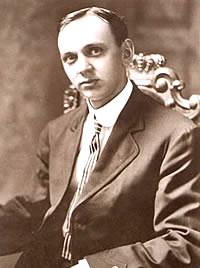
Edgar Cayce: The "Sleeping Prophet"
By Ann-Marie Kenny
About the Man
Edgar Cayce lived from 1877 to 1945, and during that time, he became known as the Sleeping Prophet. His is one of the most documented cases of a psychic in the entire 20th century. In addition to giving psychic readings during which he could look into both the past and the future, he was also widely known for his ability to diagnose illnesses. In fact, many consider him to be the “father of holistic medicine.”
Edgar Cayce’s psychic abilities started to appear when he was only a child. He was known to visit with his deceased grandfather and to play with a number of spirits who had already crossed over. One of his most remarkable gifts, however, was the apparent ability to memorize the contents of a book after merely sleeping on it. His nickname of the Sleeping Prophet didn’t come from this ability, though. Instead, it was the result of his ability to put himself into a deep meditative state during which he would perform his readings by answering questions.
The majority of Edgar Cayce’s work was with individuals seeking help for health issues. He would receive their questions and would then enter his trance state in order to interpret the answer from the universe. As his influence grew, so did his areas of interest, and he eventually offered readings on past lives, spirituality, dream interpretation, and more. According to Cayce, he did not actually remember the things he said during his reading, so he was surprised to learn that he had been sharing ideas on subjects like auras, reincarnation, and mediumship. He began to delve into these topics, as well.
Cayce’s Insights
It is estimated that Edgar Cayce performed 21,000-22,000 readings in his lifetime, and approximately 14,000 of them are available to the public. He focused on several major themes throughout his lifetime, and his insights into each have been very important to those who study his beliefs. It is interesting to note that Cayce considered himself to be a Christian and that his work was done before the New Age movement had begun.
Of course, Cayce’s main focus was on health issues. As a result of his readings, he often recommended a number of treatments that are now considered to be part of holistic or naturopathic medicine. For example, he recommended osteopathic adjustments and massage for various ailments. He also encouraged many of his clients to modify their diets by avoiding red meat, white breads, and alcohol, as well as to increase the intake of alkaline foods, leafy vegetables, and fruits. We now know that these are precisely the best practices to follow in creating a healthy diet.
Another topic that Edgar Cayce often discussed was the lost civilization of Atlantis. These advanced people ultimately destroyed their own land and became refugees to Egypt and the Americas. Also a proponent of reincarnation, Cayce believed that many of those alive today are actually reincarnations of Atlantean souls. He even viewed himself as the reincarnation of an Egyptian priest called Ra Ta, and Cayce’s work was a continuation of that started by the priest thousands of years earlier.
Those who want to learn more about the Sleeping Prophet can find dozens of books written about Edgar Cayce. Some of these include:
- The Edgar Cayce Primer: Discovering the Path to Self Transformation by Herbert Puryear
- The Edgar Cayce Remedies by William A. McGarey
- Edgar Cayce on the Akashic Records: The Book of Life by Kevin J. Todeschi
- Edgar Cayce Encyclopedia of Healing by Reba Ann Karp
- Edgar Cayce: An American Prophet by Sidney D. Kirkpatrick
- Edgar Cayce on Handbook for Creating Your Future by Mark Thurston and Christopher Fazel
There are a number of other books written by and about Edgar Case, as well as several films. Those interested in a variety of New Age and holistic topics can expect to learn a lot from this man who had so much to offer in so many areas.
For more information on Edgar Cayce online, visit his official website: http://www.edgarcayce.org

